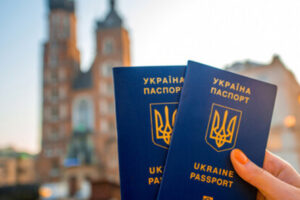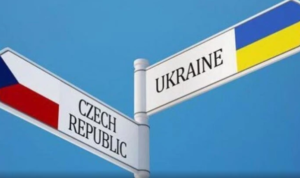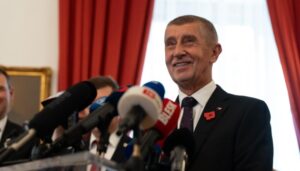
The new Czech government intends to prepare guarantee and insurance programmes for companies planning to operate in the Ukrainian market in order to reduce the risks associated with project implementation and deliveries, said First Deputy Prime Minister and Minister of Industry and Trade of the Czech Republic Karel Havlíček.
Havlíček noted that Ukraine was previously among the Czech Republic’s five largest trading partners outside the EU, and, in his estimation, mutual trade is showing signs of recovery after a decline during the war. He stressed that the state can play a practical role in helping businesses participate in projects in the energy sector, transport infrastructure and, in particular, the construction of hospitals.
According to the official, teams from both countries are already working on economic contacts, initially online, followed by face-to-face meetings between business representatives and relevant government agencies.
As reported, the new Czech government headed by Andrej Babiš was sworn in on 15 December 2025.

The Chairman of the Verkhovna Rada, Ruslan Stefanchuk, considers the statements made by the Speaker of the Chamber of Deputies of the Czech Parliament, Tomio Okamura, against providing weapons to Ukraine to be an example of ignorance and cynicism.
“Tomio Okamura’s New Year’s address is a striking example of ignorance, manipulation, and cynicism. By once again insulting Ukraine and Ukrainians, he is actually harming and discrediting the Czech Republic and the Czech people, who remain on the side of dignity and justice, on the side of Ukraine,” Stefanchuk wrote on Facebook on Friday.
According to him, Ukraine is grateful to the great Czech people and their worthy representatives for all their help and support in difficult times.
In Stefanchuk’s opinion, the statements of the Czech speaker are exclusively his personal position, not the position of the Czech parliament and the Czech people.
“I am convinced that the harshest assessment of Okamura’s words will be given by the Czechs themselves — and, of course, by history, in which his name is unlikely to be preserved. And we will definitely find out whether he was a useful idiot or an FSB agent,” the speaker of the Ukrainian parliament emphasized.
According to Česke noviny (CTK), Speaker of the Chamber of Deputies Tomio Okamura (SDP) “once again spoke out on social media against providing weapons to Ukraine.”
“I believe that our republic will jump off the Brussels train, which, despite warnings from the US government, is heading towards World War III… I understand that it is profitable for the West when we pay Western arms companies for ineffective weapons that the Russians will neutralize before they even reach the front,“ CTK quotes the Speaker of the Chamber of Deputies as saying.
”Money is flowing in all directions, and everyone is getting something out of this business. Western companies and governments, as well as Ukrainian thieves around Zelensky’s junta, who are building toilets out of gold… Let them steal, but not from us, and let there be no such country in the European Union,” CTK quotes a fragment of Okamura’s speech.

In September 2025, there was an annual peak in the granting of temporary status to Ukrainian citizens in European Union countries, according to Eurostat.
“In October 2025, EU countries issued 74,175 new decisions on granting temporary protection. This is the second highest monthly figure in 2025 after the peak recorded in September (79,525). These high figures are the result of a decree by the Ukrainian government, adopted at the end of August 2025, which grants men aged 18 to 22 inclusive the right to leave Ukraine without hindrance,” the report says.
As of October 31, 2025, Ukrainian citizens accounted for more than 98.4% of those who received temporary protection in the EU. Adult women accounted for 43.8% of those who received temporary protection. Minors accounted for almost a third (30.8%), and adult men for just over a quarter (25.5%) of the total number
. As of October 31, 2025, a total of 4.3 million non-EU citizens who fled Ukraine had temporary protection status in the EU. Compared to the end of September 2025, the total number of persons from Ukraine under temporary protection decreased by 6,170 (-0.1%).
The EU countries that received the largest number of persons from Ukraine under temporary protection were Germany (1,229,960 persons; 28.6% of the total number in the EU), Poland (965,005; 22.5%), and the Czech Republic (393,005; 9.1%).
CZECH REPUBLIC, GERMANY, POLAND, TEMPORARY PROTECTION, UKRAINIANS

For the first time in 2025, a separate annual quota for the supply of 30,000 tons of Ukrainian flour to the European Union has been granted, which opens up opportunities for long-term planning for the domestic flour milling business, said Rodion Rybchinsky, director of the Ukrainian Flour Millers Association.
“The top 10 export-oriented companies have already invested around EUR 17 million in modernization and now understand that these investments will have prospects,” he said at the “Agribusiness in Ukraine” conference in Kyiv on Thursday.
He recalled that until 2022, flour was exported within the joint quota with wheat. Flour millers usually did not have time to deliver their products to the EU, as grain traders were the first to choose the quota. Only after the opening of trade preferences in 2022 did Ukrainian flour begin to actively enter the EU market, and in 2023, flour exports to EU countries amounted to 73,000 tons.
“These volumes became an argument in the negotiations: if 73,000 tons were successfully delivered to the EU, the question of Ukrainian flour’s non-compliance with European quality requirements would be moot,” said Rybchynskyi.
According to him, Ukrainian flour is now available in Germany, the Czech Republic, Spain, and Italy, which is clear proof of the high quality of Ukrainian products.
Rybchynskyi noted that during the 11 months of 2025, Ukraine supplied 26,000 tons of this product to the EU, so by the end of the year, domestic producers will be able to fully use the quota. At the same time, the biggest problem for flour millers in 2026, if we assess the prospects of the industry, will be the labor shortage.
He named the European Millers’ Congress in France as one of the most anticipated events in the industry next year, during which the Ukrainian side will try to find arguments and establish contact, in particular, with the Romanian Association of Flour Producers, as well as try to lay the groundwork for a review of quotas in 2028. According to Rybchynsky’s estimates, Ukraine is capable of supplying 300,000 tons of flour to the EU market.

The new Czech government is working on changes to the rules on temporary protection and social support for Ukrainian citizens: assistance will focus on those who are objectively unable to support themselves (the elderly, people with disabilities, parents with young children), while payments for those who are able to work but are unemployed may be reduced or cancelled, according to Czech media reports. The Ukrainian publication ZN.ua, citing Novinky.cz, reports that the government is also preparing to adjust the conditions for temporary protection status. The specific parameters of the reform have not yet been made public.
According to Novinky.cz and previous EU decisions, temporary protection for Ukrainians in the Czech Republic will remain in effect until at least March 2027. In previous years, the government has already adjusted humanitarian payments (through Lex Ukrajina) and announced a transition to a more ‘activating’ model of support that encourages employment.
In June, the European Union agreed to extend the temporary protection mechanism until March 2027; Czech ministers had previously confirmed their commitment to longer-term protection with gradually increasing integration requirements (work, education, housing). Against the backdrop of these changes, the government is preparing further technical amendments to the national package of laws known as Lex Ukrajina.
After the publication of the government draft (expected in autumn-winter), the document must undergo interdepartmental approval and parliament. Details of the amounts and criteria for payments will be known from the text of the draft law and accompanying methodological materials from the Ministry of Labour.
Under temporary protection: there are currently approximately 395-400 thousand people in the Czech Republic (current estimates by the Czech media based on data from the Ministry of the Interior; in February 2025, the UNHCR recorded about 390 thousand).
The total number of Ukrainian citizens with various types of residence (officially registered foreigners) is approximately 560-581 thousand (data from the Czech Ministry of the Interior for Q1-Q2 2025). Informal/incomplete records may vary due to seasonal migration and repeated departures and arrivals; the total estimate in public sources is approximately 600 thousand.

On Monday, November 3, ANO party leader and likely future Czech Prime Minister Andrej Babiš signed a coalition agreement with the far-right Freedom and Direct Democracy (SPD) party and the Motorists for Themselves political force, Radio Prague International reports, citing European Truth.
After four weeks of negotiations, the parties agreed on the main program goals of the future government, as well as the distribution of ministerial portfolios among the parties.
“The agreement defines political priorities, the number of ministers, and the principles of government personnel formation,” ANO representatives said.
The next step will be to submit proposals for the composition of the government, followed by a vote in parliament.
Tomio Okamura, leader of the SPD, who was nominated jointly by the SPD, ANO, and Motorists, is expected to become speaker of the Chamber of Deputies.
During the election campaign, Okamura repeatedly made anti-Ukrainian statements, in particular regarding the restriction of the rights of Ukrainian refugees in the Czech Republic.
After the election of the speaker of parliament, the current government must resign, which will pave the way for the formation of a new cabinet headed by Babiš.
On October 27, Czech President Petr Pavel officially tasked Andrej Babiš with forming a government after the ANO party won the parliamentary elections on October 3–4, 2025.
ANO received the most votes among all political forces, ahead of the Together coalition and the Social Democrats.
According to preliminary data, Babiš’s cabinet will consist of 15 ministers, half of whom will be appointed by ANO, five by the SPD, and two by the Motorists party.
Andrej Babiš already headed the Czech government in 2017–2021. His ANO party positions itself as “centrist” and advocates strong state support for business. The SPD is known for its Eurosceptic and anti-immigration positions, while the Motorists for Themselves party advocates for the liberalization of traffic rules and lower taxes for the transport sector.
ANO, Babiš, CZECH REPUBLIC, ELECTIONS, GOVERNMENT, PARLIAMENT, SPD, Томіо Окамура